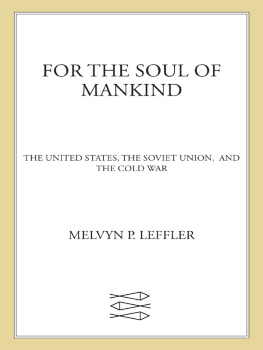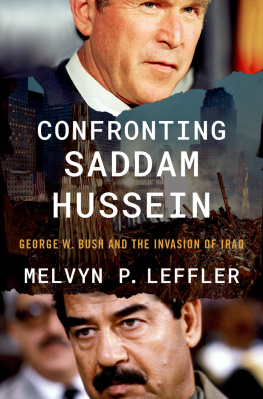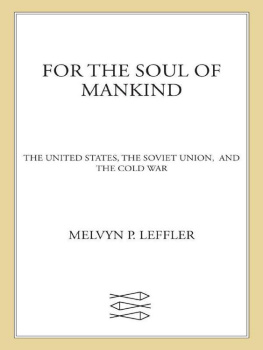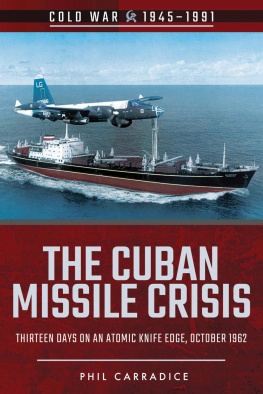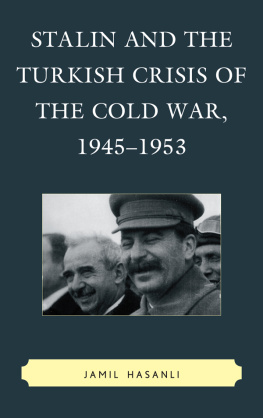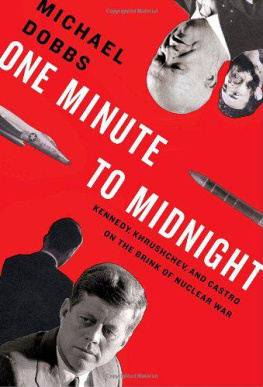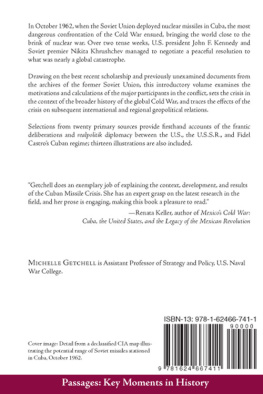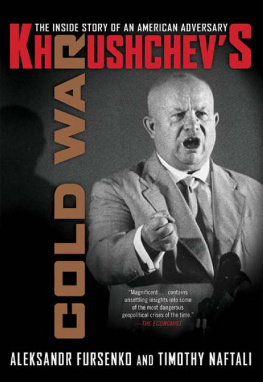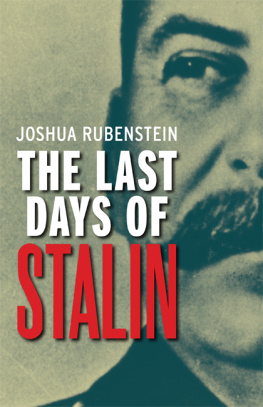Acknowledgments

I have been working on this book since the middle 1990s, and many people and institutions have contributed to it. At the outset, I needed released time from my university obligations to do the research, and a joint fellowship from the National Archives and the University of Maryland allowed me to examine the official U.S. records housed at Archives II. That same year, 199596, I received a travel grant from the John F. Kennedy Library that enabled me to investigate key documents there. Soon thereafter, the Norwegian Nobel Institute invited me to Oslo for a month, and there I had time to think about the larger contours of this project and to begin writing essays that helped me to understand the issues I needed to explore in greater depth. Geir Lundestad, the director of the Norwegian Nobel Institute, and his staff were marvelous hosts, and the seminars they organized and the conversation they inspired made my days in Oslo among the most enjoyable and meaningful of my career.
When I became dean of the College and Graduate School of Arts and Sciences at the University of Virginia in 1997, I put this project on a back burner for four years. I resigned from that position in 2001 and applied for a fellowship at the Woodrow Wilson International Center for Scholars. I arrived there during the first week of September 2001 and witnessed the harrowing events of 9/11 on a television screen at the Ronald Reagan Building and International Trade Center, where the Wilson Center is located. Despite the turbulence and distractions of life in Washington in the aftermath of 9/11, I benefited enormously from the resources, support, and collegiality of the staff and scholars at the Wilson Center. I owe special thanks to Sam Wells, Rob Littwak, and Christian Ostermann for making my fellowship year such a meaningful experience and for providing me with the opportunity to return to serious scholarship after four years as a university administrator. The following year, 20022003, I had the privilege to be the Harmsworth Professor at the University of Oxford, where, among other duties, I attended lectures and seminars and learned a great deal from some of the worlds most eminent scholars of Russian and Soviet politics and some of the most influential writers of international history and relations. When I returned from Oxford, I knew the time had come to turn the years of research and thinking about this book into a manuscript. Fortunately, I received fellowship support from the United States Institute of Peace and the John W. Kluge Center of the Library of Congress, where I was selected as the Henry Kissinger Fellow. I am greatly indebted to those institutions for allowing me to have the time to write in an uninterrupted way among scholars and practitioners with widely disparate specialties but who were interested in my scholarship, and who forced me to think about the contemporary salience of my topic. Ginny Bouvier at the USIP took a particular interest in my work, and offered wonderful assistance and insightful comments on my chapters. The University of Virginia generously allowed me to take advantage of these many fellowship opportunities. I am grateful to Chuck McCurdy and to Ed Ayers for their support.
Many friends and colleagues made this book possible. Mark Kramer and Norman Naimark read the penultimate draft of this manuscript. Their attention to detail and their knowledge of the history of Soviet foreign policy saved me from committing numerous errors, and their capacity to conceptualize and analyze forced me to think more deeply about matters large and small. I am extremely grateful to them for the time they invested in my manuscript. I also called upon some of my oldest professional friendsFrank Costigliola, Robert McMahon, and David Painterto review all or part of my manuscript. As they have done many times in the past, they read my chapters with care, pointed out issues I needed to address yet again, and sent me to new articles and books that I needed to consider. At the University of Virginia I am fortunate to have colleagues who were determined to help a former dean return to serious scholarship. Peter Onuf is a special friend with a special talent. He listened to my arguments, reconceptualized my ideas in fresh and innovative ways, and made them seem more interesting than I had ever imagined. Lunches with Peter were always seminars on my topic, with him probing, extrapolating, and summarizing. He made me appreciate what I was trying to do, and he inspired me to take risks. When Peter was not around, Brian Balogh often took his place, nurturing and supporting me, and always affirming that the book would get done. Beyond my home institution, my friend John Arthur never ceased asking me about my ideas and never ceased demanding that I clarify my thinking. Among the most thoughtful people I have ever known, John, a philosopher, taught me how to explore a question from a multitude of perspectives. His wisdom has enhanced my scholarship and sharpened my analytic capabilities. Two scholars who have helped me to expand my intellectual horizons are Odd Arne Westad and Chen Jian. Brilliant historians with unmatched knowledge of Soviet and Chinese source materials, and with an intellectual disposition different from my own, they have taught me a great deal about the role of ideology in the Cold War and the dynamics of great power rivalries in East Asia and the third world. I have also benefited from the insights offered by Vojtech Mastny, who graciously read two of the chapters of this book and offered sage advice. Just as I was finishing the manuscript, Vlad Zubok sent me extremely helpful comments on the Brezhnev and Gorbachev chapters. Over the years, I have learned a great deal about Soviet foreign policy from Vlad, and his wisdom informs many of the pages of this book.
When I conceived this project, I wanted to give the Soviet side of the Cold War the same attention as I gave to the American perspective. Yet I knew I was handicapped by inadequate knowledge of Russian and other languages. I have worked assiduously to compensate for this handicap, assuredly never overcoming it but benefiting enormously from the assistance of others. Since the early 1990s, the Cold War International History Project and the National Security Archive have been gathering documents from the other side of the Cold War, translating many of them, and disseminating them to interested scholars. Their oral history conferences have brought scholars and practitioners together and have served as incentives for governments to declassify documents that otherwise might have remained secret for decades. While I was a fellow at the Woodrow Wilson International Center in 20012002, Christian Ostermann acquainted me with the resources collected over many years by the Cold War International History Project, and Tom Blanton encouraged me to use the treasure trove of documents he and his associates had been collecting at the National Security Archive. This book simply would have been impossible without Christians and Toms help. Toms loyal associatesMalcolm Byrne, Bill Burr, and Svetlana Savranskayaassisted me at many key moments and directed me to the pertinent Russian, Chinese, Polish, East German, Czech, Hungarian, and American documents they had been gathering. To employ these documents to the fullest, I have relied on many translators. Pierre Du Quesnoy and Alexander Alexandrovich Melnikov began translating Russian documents for me in 20012002. During my fellowship year at the U.S. Institute of Peace, Isaiah Gruber and Anton Fedyashin, graduate students at Georgetown University, resumed the translating task with enthusiasm. Not only did they work with Svetlana at the National Security Archive to locate many of the most useful materials, but Isaiah also went to Harvard, where, with the guidance of Mark Kramer, he examined the microfiche collections of Russian archival materials now available there. At my own institution, Tim Naftali generously made available to me his translated set of the Malin notes of the presidium meetings during the Khrushchev years. These materials are no substitute for systematic research in the archives of Russia, China, and other countries, but thanks to the translations of these friends and assistants I have tried to illuminate the thinking in Moscow with almost the same fullness with which I have sought to analyze decision making in Washington.

